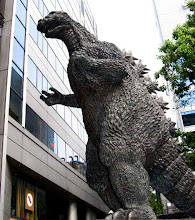


Yes people Chavez has finally outdone himself. Recently he has announced the creation of the restaurants for lower income Venezuelans, of course he suggested the name "Restaurante Chavez". As if no dictador has tried to engrave his name in the conscience of its population. I remember the president of Turkmenistan requesting to change the first month or January to his last name. His name is Saparmurat Niyazov, and coincidently he was named president for life of Turkmenistan...
At the same time, an recently insane appointed Minister of Commerce, Mr Eduardo Saman, a week ago declared to the media a "War for the Arepa", because his office could not conceive the Venezuelan arepa being sold at Bs. 18 to Bs. 20 each. The fair price, he argued would be around Bs. 1,5 to Bs. 2. He argued that the cost structure of the arepa would be usury. Now, today Mr Eduardo Saman argues that he never intended an official regulation of the arepa, like regulation of oil or foreign exchange, but an argument that consumer protection agency could prosecute Arepa business owners for usury should they sell arepas above Bs. 2.
Now this is really insane, no direct price regulation but threaten restaurant owners with criminal usury charges should they sell arepas (or any other product for that matter) above what the government deems is a fair price and falls according to their cost structure. I do not want to sound pessimist but this constitutes evidence that the government is moving to destroy private capitals.
The argument of usury is truly insane and constitutes a further violation of freedom of commerce (libertad de comercio) and protection of private property (propiedad privada). Further a clear violation of the principle of economic freedom (articles 112 and 115 CRBV) Usury clearly consitutes a limitation of freedom of commerce, but however can only be conceived when considering loans of sums of money or tradable assets, not when considering the sale of wholesale goods and services. Now, is the Venezuelan government going to prosecute everyone in Venezuela for usury as applied to sale of goods and services? Does the new Commerce Ministry going to review the cost structure of every economic activity in Venezuela so they can prosecute usury? I do not want to sound alarmist, but I do not like where this line of reasoning is going to take us...
"When money is lent on a contract to receive not only the principal sum again, but also an increase by way of compensation for the use, the increase is called interest by those who think it lawful, and usury by those who do not." (Blackstone's Commentaries on the Laws of England, p. 1336).
In the United States, usury laws are state laws that specify the maximum legal interest rate at which loans can be made. Congress has opted not to regulate interest rates on purely private transactions, although it arguably has the power to do so under the interstate commerce clause of Article I of the Constitution.
In Venezuela the regulation of usury dates back to 1946. When the then President Romulo Betancourt enacted the regulation of usury.
In its article 1 provides:
Cualquiera que intencionalmente se valga de las necesidades apremiantes de otro para obtener para sí o para un tercero una prestación, cesión, garantía o algo análogo que implique una ventaja o beneficio que, tomando en cuenta las circunstancias concomitantes, resultare notoriamente desproporcionada a la contraprestación o entrega que por su parte verificare, será castigado con prisión hasta de dos años o con multa hasta de diez mil bolívares (Bs. 10.000,00)
Sin perjuicio de la limitación que establece el Código Civil en su artículo Nº 1.746, se considera constitutivo del delito de usura el préstamo de dinero en el cual se estipule o de alguna manera se obtenga un interés que exceda de uno por ciento (1%) mensual.
"Anyone who intentionally benefits from strigent neccesaties of another in order to obtain for himself or to a third party a loan, assignment or collateral guarantee or any other form, that implies an advantage or benefit to, taking into consideration the surrounding circumstances, that results notoriously disproportioned to the original obligation or consideration will be punished with up to 2 years in prison or a fine of ten thousand bolivars (Bs. 10,000).
Without prejudice of the provision of the Civil Code article 1746 that provides for the crime of usury the loan of money that stipulates or in some other form produces an interest exceeding one percent (1%) a month."
Now recently Chavez has produced his own version of the still effective Usury decree. That is the enactment of the Special Law for the Defense of Hoarding, Speculation, Boycott and any other Conduct that affects the consumption of Food or Products subject to Price Control. With that name he clearly gives in their (or Chavez´s) frustration to control the inflationary economy. The funny thing is that the government forgot to include provision for the usury and it was left out...an evident mistake?
My prediction, Chavez government will try to regulate, whether directly through pricing controls or indirectly through legal action, sale of goods and services. Specially those considered neccesary for the population at large. This is no more than an excuse to try to control the inflationary economy. At the same time we should also see a direct devaluation of the Venezuelan currency and/or loads of economic measures, such as new taxes, increase in the value added tax (iva, currently at 9%) and increase in the tax unit (unidad tributaria). Tough economic times for Venezuela...




No comments:
Post a Comment